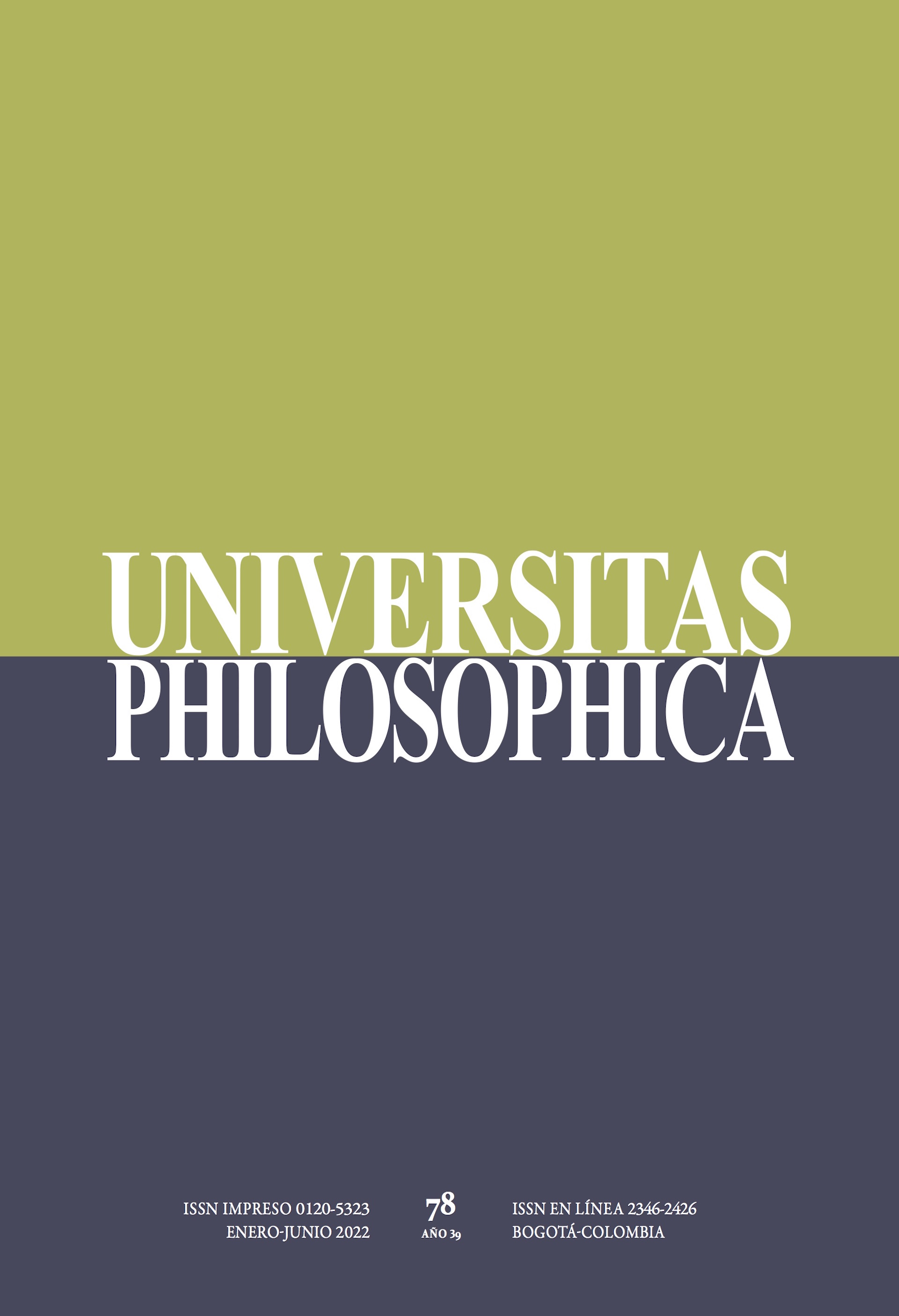Resumo
En el presente trabajo analizaremos los procedimientos metodológicos implementados por Aristóteles en el fragmento 16 de Sobre la filosofía, en los que postula cierta entidad que caracteriza como divina y eterna. Para dar cuenta de esa entidad, Aristóteles se vale de un argumento factible de dividirse en tres momentos: en el primero, presenta el razonamiento por el cual se debe aceptar su eternidad; en el segundo, establece la identificación entre lo divino y lo óptimo y se focaliza en las posibles causas por las cuales algo cambia, y, finalmente, sobre la base de este último resultado, en el tercer momento, se centra en demostrar que lo divino es inmutable. Para hacer esto, se vale de lo que suele llamar “silogismos a partir de hipótesis”. Nuestro objetivo es examinar el uso dialéctico de este tipo de silogismos, que en la primera parte del fragmento son equiparables con lo que en la terminología de la lógica actual conocemos como modus ponens y, hacia el final del fragmento, adquieren la forma de una reducción a lo imposible.
Aristote (1967). Topiques I-IV. Introduction (J. Brunschwig, Trad.). Belles Letres.
Aristote (2007). Topiques VI- VIII (J. Brunschwig, Trad.). Belles Letres.
Aristotele (1963). Aristotele, Della filosofia (M. Untersteiner, Trad.). Edizioni di Storia e Letteratura.
Aristotele (2008). Aristotele, I Dialoghi (M. Zanatta, Trad.). Biblioteca Universitaria Rizzoli.
Aristóteles (1988). Tratados de lógica (Órganon). Categorías Tópicos - Sobre las refutaciones sofísticas [Tomo I] (M. Candel, Trad.). Gredos.
Aristóteles. (1993). Física (M. Boeri, Trad.). Biblos.
Aristóteles. (1995). Tratados de lógica (Órganon). Sobre la interpretación. Analíticos primeros. Analíticos segundos. Tomo II (M. Candel, Trad.). Gredos.
Aristóteles (2005). Fragmentos (A. Vallejo Campos, Trad.). Gredos.
Aristóteles (1962-1963). Sobre la filosofía y sobre el bien: fragmentos selectos (J. Teuzabá, Trad.), Ideas y valores, 4 (15-16), 92- 133.
Aristóteles (1996). Sobre el cielo (M. Candel, Trad. ), Gredos.
Bernays, J. (1968). Dialoge des Aristoteles in ihrem Verhaltnis zu seinen übrigen Werken. Hertz.
Berti, E. (1962). La filosofia del “primo” Aristotele. Cedam.
Berti, E. (1987). Contraddizione e dialettica negli antichi e nei moderni. L’EPOS.
Berti, E. (1997). La filosofia del “primo” Aristotele. Centro di Richerche di Metafisica dell’Università Cattolica del Sacro Cuore.
Berti, E. (2004). Aristotele: dalla dialettica alla filosofia prima. Bompiani.
Berti, E. (2008). Las razones de Aristóteles. Oinos.
Besnier, B. (1998). La définition aristotélicienne du changement. En P. M. Morel (Ed.), Aristote et la notion de nature. Enjeux épistémologiques et pratiques (pp. 15-34). Presses Universitaires de Bordeaux.
Bignone, E. (1973). L’Aristotele perduto e la formazione filosofica di Epicuro. La Nuova Italia.
Bobzien, S. (2002). The Development of Modus Ponens in Antiquity: From Aristotle to the 2nd Century AD. Phronesis, 47 (4), 359-394.
Bochensky, I. M. (1951). Ancient Formal Logic. Holland Publishing Co.
Boss, P. (2008). A Double Theology in Aristotle, De philosophia, fr. 26 Ross (= Cic., De natura deorum 1.13.33). Prudentia, 20, 43-64.
Capacho, L. (2008). La lógica proposicional en Analíticos de Aristóteles. Revista de Filosofía Univiversidad de Costa Rica, 64 (117/118), 137-143.
Cherniss, H. (1946) Aristotle's Criticism of Plato and the Academy. Johns Hopkins Press.
Cooper, J. (1987). Hypothetical Necessity and Natural Teleology. En J. Lennox y A. Gotthelf (Ed.), Philosophical Issues in Aristotle’s Biology (pp. 243-274). Cambridge University Press.
Corcoran, J. (1974). Aristotle’s Natural Deduction System. En J. Corcoran (Ed.), Ancient Logic and its Modern Interpretations (pp. 85-132). Reidel Publishing Company.
Düring, I. (1961), Aristotle’s Protrepticus, An Attempt at Reconstruction, , Almqvist & Wiksell.
Düring, I. (1990). Aristóteles. Exposición e interpretación de su pensamiento (B. Navarro, Trad.). Universidad Nacional Autónoma de México.
Guthrie, W. K. C. (1933). The development of Aristotle’s dieology. Class. Quarterly, (27), 162-171
Jaeger, W. (1993). Aristóteles. Bases para la historia de su desarrollo (J. Gaos, Trad.). Fondo de Cultura Económica.
Kneale W. C. y Kneale, M. (1962). The Development of Logic. Clarendon Press.
Lear, J. (1980). Aristotle and Logical Theory. Cambridge University Press.
Lukasiewicz, J. (1957). Aristotle’s Syllogistic From The Standpoint of Modern Formal Logic. Clarendon Press.
Malink, M. (2018). Demonstration by reductio ad impossibile in Posterior Analytics https://as.nyu.edu/content/dam/nyu-as/philosophy/documents/Malink_Demonstration%20by%20reductio%20in%20Posterior%20Analytics%201.26.pdf
Mié, F. (2013). Demostración y silogismo en los Analíticos segundos. Reconstrucción y discusión. Diánoia, 58 (70), 35-58.
Quarantotto, D. (2002). Causa finale, sostanza, essenza in Aristotele. Saggio sulla struttura dei processi teleologici naturali e sulla funzione del telos. Bibliopolis.
Rose, V. (1966). Aristotelis qui ferebantur Librorum Fragmenta. Teubner.
Ross, W. D. (1964). Aristotelis Dialogorum Fragmenta. Clarendon Press.
Rossi, G. (2006). Entre lo accidental y lo aparente: la peculiar constelación causal del azar según Aristóteles. Tópicos 30 bis, 147-170.
Rossi, G. (2011). El azar según Aristóteles. Estructuras de la causalidad accidental en los procesos naturales y en la acción. Akademie Verlag.
Slomkowski, P. (1997). Aristotle's Topics [Philosophia Antiqua; vol. 74]. Brill.

Este trabalho está licenciado sob uma licença Creative Commons Attribution 4.0 International License.
Copyright (c) 2022 Claudia Seggiaro


